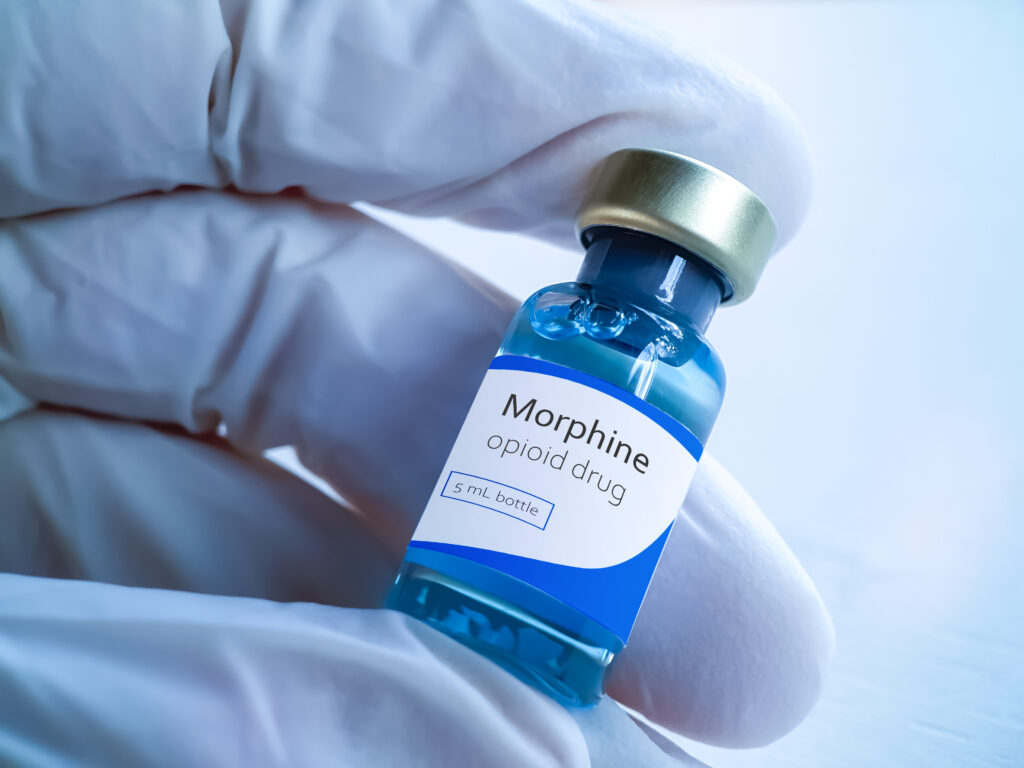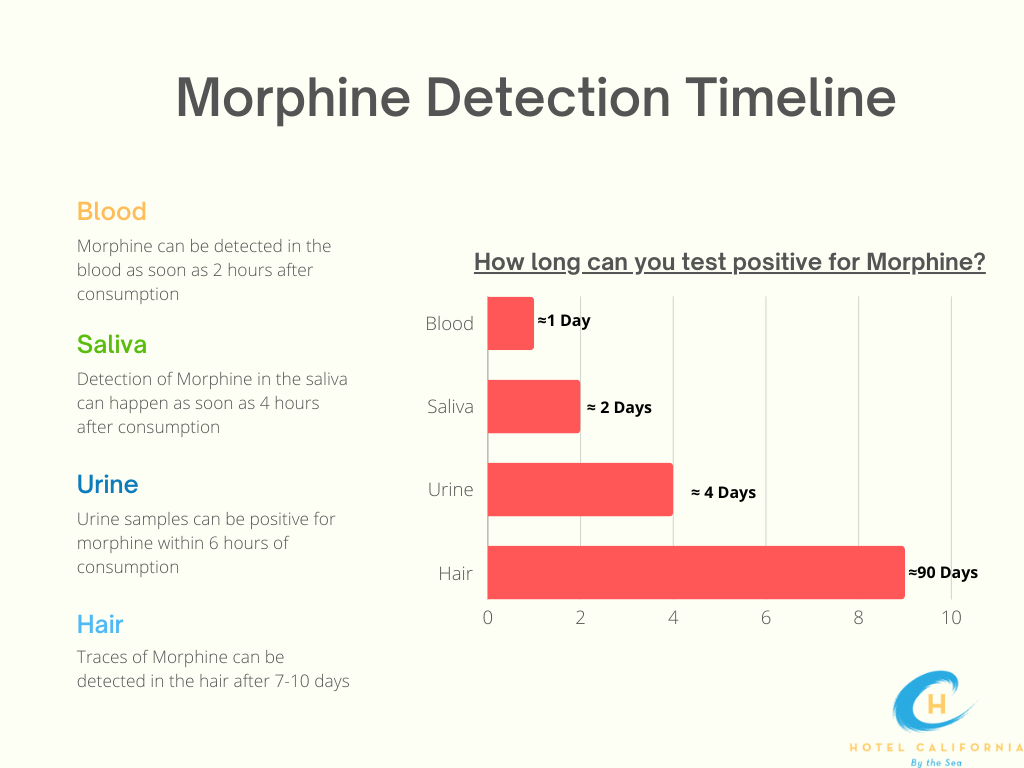How long will Morphine stay in your system?
Morphine is an opioid. It is a naturally occurring substance derived from the poppy plant. It is a classic opioid analgesic that is often prescribed to treat moderate to severe pain, chronic pain and pain management conditions post-surgery. An estimated 10% of the U.S. population has reportedly abused opiates such as morphine in their lifetime. Between the years 1998 – 2018, an estimated 450,000 people died of opioid overdose, which included morphine. The Schedule II narcotic produces feelings of relaxation and euphoria, making the drug a high risk for abuse, addiction and overdose.

Morphine works by affecting the pleasure center of the brain. It binds directly to the mu-opioid receptors in the central nervous system to block pain signals from reaching your brain. This produces feelings of physical pain relief, decrease in appetite, inhibition of the cough reflex, reduced anxiety, extreme relaxation and euphoria.
The CNS depressant was named after Morpheus, the Greek god of dreams. This is because it produces feelings of euphoria and is described as being in a dreamlike state of mind. Common brand names of morphine include Roxanol and Kadain. Common street names for morphine include Dreamer, first line, Mister Blue, morpho and Morf. Morphine has a similar chemical makeup to heroin and produces similar effects as other opioid drugs such as methadone, hydrocodone, fentanyl and oxycodone.
More about Morphine
Morphine is available in many different forms including tablets, capsules, liquids, epidurals and nebulizers. It can be administered orally, intravenously, subcutaneously and intramuscularly. Like many other opioids, morphine produces feelings of intense relaxation and euphoria. These effects are often abused leading to the development of opioid addiction. In fact, more than 60% of morphine addicts admit to getting their drugs from friends or family.
Mixing two central nervous system depressants can result in dangerous symptoms including respiratory depression and extreme sedation. When combined with other substances such as alcohol, users are at greater risk for developing an addiction and experiencing withdrawal symptoms. Opioids like morphine produce intense withdrawal effects making the addiction more difficult to overcome. Physical withdrawal symptoms can peak within a few days of removing the drug from the system. However, symptoms can linger on for weeks after.

Withdrawal Symptoms
- Restlessness
- Irritability
- Anxiety
- Muscle spasms
- Backpain
- Diarrhea
- Insomnia, restlessness and difficulty sleeping
- Vomiting
- Rapid breathing and heart rate
- High blood pressure
- Sweating
Morphine misuse causes physical dependence and can also cause changes in brain chemistry. Other side effects include slowed breathing, changes in heart rate, low blood pressure, stomach pain, difficulty sleeping,
How long will the effects of Morphine last?
The length of morphine’s effects on the body can be dependent on many factors. With extended-release formulations of the drug, the effects can take longer to reach a peak concentration in the bloodstream and can last anywhere from 8-12 hours. When taking morphine orally, the effects of the drug can be felt within 30-60 minutes. Immediate-release formulations of the drugs have lasting effects between 4-6 hours on average. With injectable versions of morphine, the onset effects of the drug are felt much more quickly. The effects can begin with 5-20 minutes, peaking at 60 minutes and lasting between 3-4 hours.
How long will Morphine stay in your system?
Despite not feeling the effects of morphine, the drug can remain in the system for longer. Morphine’s half-life ranges between 2-4 hours. Although, it can be longer depending on the dosage of the drug. Immediate release half-life ranges from 1-4 hours, while an injection half-life can extend for up to 24 hours.
Compared to other opioids, the body can quickly metabolize morphine. The drug can exit the bloodstream rapidly and through urine within an average period of 12 hours. In urine tests, morphine can be detected for up to three days after the initial dose. In saliva tests, morphine can be detected for up to four days after the initial dose. In blood tests, morphine can be detected for up to three days after the initial dose.
Is there a way to speed up the processing of morphine in the body? The short answer is no. There is no clinically proven way to speed up the metabolism of morphine in the body. Although many factors affect how the drug is broken down in the body, there is no way of speeding up the process of elimination.
Check Your Insurance Coverage for FREE
Find out if your insurance covers addiction treatment in minutes. We accept most insurance!
Factors that Affect how long Morphine can stay in your system
- Age – older people metabolize drugs at a much slower rate compared to younger people
- Body height and weight – smaller bodies feel the effects of the drug more compared to bigger bodies
- Individual metabolism – a slower metabolism means the drug remains in the bloodstream and body for longer causing more intoxication
- Medical history
- Biology and genetics
- Morphine dosage – the length of time it takes to eliminate the drug directly correlates to the amount of morphine present in the body
- Presence of other substances such as alcohol and other CNS depressants
- Liver and kidney functions – morphine is processed in the liver and kidney and if these organs are not functioning properly, they can become overwhelmed leading to irregular functions and slowed elimination process of the drug
Signs you may be addicted to Morphine
- Decrease in self-care and poor personal hygiene
- Financially struggling due to money spent on buying and using morphine
- Lying and keeping secrets
- Withdrawing from normal activities you once loved and participated in
- Decreased performance in school or work
- Deteriorating relationships with friends, families and coworkers
Reach out to Hotel California by the Sea
We specialize in treating addiction and other co-occurring disorders, such as PTSD. Our Admissions specialists are available to walk you through the best options for treating your addiction.
Treatment of Morphine Addiction
Morphine is an opioid. Opioid addiction can be a very difficult disease to overcome. The U.S. has been battling an opioid addiction crisis for the past decades and the number of overdoses has continued to climb. There are many factors contributing to this epidemic. One way to combat this health crisis is through professional treatment programs such as Hotel California by the Sea. Our substance use disorder program specifically focusing on opioid abuse, provides clients with the care and resources they need to overcome their addiction.
We offer varying levels of care including drug detox, inpatient residential programs, partial hospitalization programs and intensive outpatient programming. We focus on creating individualized treatment plans for our clients. We are also a dual diagnosis facility and specialize in treating co-occurring mental health disorders. Oftentimes, mental health conditions such as anxiety, PTSD and bipolar disorder contribute to the severity of the substance addiction. Our evidence-proven treatments such as CBT, DBT and EMDR therapy help clients manage these mental health disorders in an effective and productive manner. Hotel California by the Sea is dedicated to helping our clients achieve sobriety and long-term recovery.
References:
https://www.healthline.com/health/how-long-does-morphine-stay-in-your-system
https://www.rehabcenter.net/morphine/detection-time/
https://anrclinic.com/blog/how-long-does-morphine-stay-in-your-system/
https://www.medicalnewstoday.com/articles/how-long-does-morphine-stay-in-the-system
https://zinniahealth.com/substance-use/morphine/duration
https://www.dea.gov/sites/default/files/2020-06/Morphine-2020.pdf
https://www.ncbi.nlm.nih.gov/books/NBK526115/
https://www.addictioncenter.com/opiates/morphine/
